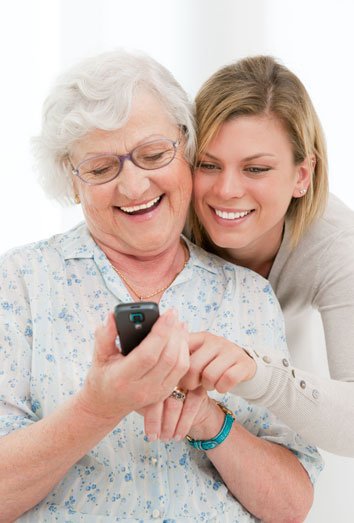The use of new technologies sometimes implies a reduction in our cognitive capacity. Computers, laptops, smartphones, tablets, etc. They contain applications that make our daily lives easier but can impair our memory capacity. We no longer need to memorize important phone numbers, nor the location of the streets, nor remember birthdays or appointments, because our gadgets already take care of giving us the notice on time.

The iPod and music therapy
- However, not everything is negative about new technologies and recent studies show that they can considerably improve the quality of life of Alzheimer’s and senile dementia patients.
- A few years ago, a Long Island social worker began working with iPods in nursing homes. He soon verified how patients with senile dementia and Alzheimer’s reacted favorably to listening to songs from their youth, or just music they liked, some of them even interacting with their environment and recovering lost abilities.
- The positive effects of music therapy in people with behavior problems are well known and it is also useful for developing learning capacity and stimulating memory.
New technologies at the service of health
- The new technologies have been put at the service of health to stimulate Alzheimer’s patients and in some cases, allow them an autonomy that they had lost. Computer programs work on aspects such as visual attention, memory and perceptual speed. And video consoles, for example, are a fundamental ally in the treatment of these patients, favoring their rehabilitation.
- More and more devices, tableware programs and mobile applications appear that inform the patient about daily acts such as washing, eating, brushing teeth, which allow the patient greater autonomy. And an interesting resource is the location software, which in case of loss, guides the patient on how to return home or notifies her relatives to be able to find it.
- But not only Alzheimer’s patients benefit from new technologies. They are also used to develop the learning of people with intellectual disabilities, and are of great help to those with visual or hearing deficiencies.
- People with deafblindness have at their disposal an innovative communication system based on a mobile device and a peripheral that translates the information automatically, thus avoiding the need to be accompanied by an interpreter, which entails full integration into their social environment.
- In short, new technologies can be applied to improve many diseases, in the development of memory, in the treatment of dyslexia, in behavioral disorders. Being able to be an ally of health, we should take advantage of the advantages that new technologies offer us, always keeping in mind what we are using them for. The key is not to let ourselves be overcome by laziness and excessive comfort and avoid abusing technology to the detriment of those capabilities that we ourselves possess.
